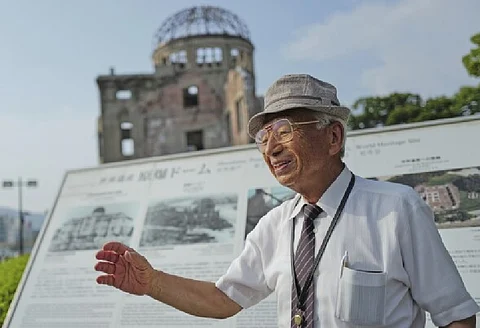

Hiroshima | Eighty years after the atomic bombing of Hiroshima and Nagasaki, a dwindling number of the aging Japanese survivors are increasingly frustrated by growing nuclear threats and the acceptance of nuclear weapons by global leaders.
The US attack on Hiroshima on August 6, 1945, and three days later on Nagasaki killed more than 200,000 people by the end of that year. Others survived but with radiation illness.
About 100,000 survivors are still alive. Many hid their experiences to protect themselves and their families from discrimination that still exists. Others could not talk about what happened because of the trauma they suffered.
Some survivors have begun to speak out late in their lives, hoping to encourage others to push for the end of nuclear weapons.
An English-speaking guide at Hiroshima's peace park Despite numerous health issues, survivor Kunihiko Iida, 83, has devoted his retirement years to telling his story as a way to advocate for nuclear disarmament.
He volunteers as a guide at Hiroshima's Peace Memorial Park. He wants to raise awareness among foreigners because he feels their understanding of the bombings is lacking.
It took him 60 years to be able to talk about his ordeal in public.
When the US dropped a uranium bomb on Hiroshima, Iida was 900 metres away from the hypocentre, at a house where his mother grew up.
He was three years old. He remembers the intensity of the blast. It was as if he was thrown out of a building. He found himself alone underneath the debris, bleeding from shards of broken glass all over his body.
"Mommy, help!" he tried to scream, but his voice did not come out. Eventually, he was rescued by his grandfather.
Within a month, his 25-year-old mother and four-year-old sister died after developing nosebleeds, skin problems and fatigue. Iida had similar radiation effects through elementary school, though he gradually regained his health.
He was almost 60 when he finally visited the peace park at the hypocentre, the first time since the bombing, asked by his aging aunt to keep her company.
After he decided to start telling his story, it was not easy. Overwhelmed by emotion, it took him a few years before he could speak in public.
In June, he met with students in Paris, London and Warsaw on a government-commissioned peace programme. Despite his worries about how his calls for nuclear abolishment would be perceived in nuclear-armed states like Britain and France, he received applause and handshakes.
Iida says he tries to get students to imagine the aftermath of a nuclear attack, how it would destroy both sides and leave behind highly-radioactive contamination.
"The only path to peace is nuclear weapons' abolishment. There is no other way," Iida said.
A regular at anti-war protests
Fumiko Doi, 86, would not have survived the atomic bombing on Nagasaki if a train she was on had been on time. The train was scheduled to arrive at Urakami station around 11 am, just when the bomb was dropped above a nearby cathedral.
With the delay, the train was five kilometres away. Through the windows, Doi, then six years old, saw the flash. She covered her eyes and bent over as shards of broken windows rained down. Nearby passengers covered her for protection.
People on the street had their hair burnt. Their faces were charcoal black and their clothes were in pieces, she said.
Doi told her children of the experience in writing, but long hid her status as a survivor because of fear of discrimination.
Doi married another survivor. She worried their four children would suffer from radiation effects. Her mother and two of her three brothers died of cancer, and two sisters have struggled with their health.
Her father, a local official, was mobilised to collect bodies and soon developed radiation symptoms. He later became a teacher and described what he had seen, his sorrow and pain in poetry, a teary Doi explained.
Doi began speaking out after seeing the 2011 Fukushima Daiichi nuclear disaster following a strong earthquake and tsunami, which caused radioactive contamination.
She travels from her home in Fukuoka to join anti-war rallies, and speaks out against atomic weapons.
"Some people have forgotten about the atomic bombings ... That is sad," she said, noting that some countries still possess and develop nuclear weapons more powerful than those used 80 years ago.
"If one hits Japan, we will be destroyed. If more are used around the world, that is the end of the Earth," she said. ”That is why I grab every chance to speak out." At Hiroshima, learning from survivors
After the 2023 Hiroshima G7 meeting of global leaders and the Nobel Peace Prize awarded to the grassroots survivors' group Nihon Hidankyo last year, visitors to Hiroshima and Nagasaki peace museums have soared, with about one third of them coming from abroad.
On a recent day, most of the visitors at the Hiroshima peace park were non-Japanese. Samantha Anne, an American, said she wanted her children to understand the bombing.
"It is a reminder of how much devastation one decision can make," Anne said.
Katsumi Takahashi, a 74-year-old volunteer specialising in guided walks of the area, welcomes foreign visitors but worries about Japanese youth ignoring their own history.
On his way home, Iida, the survivor and guide, stopped by a monument dedicated to the children killed. Millions of colourful paper cranes, known as the symbol of peace, hung nearby, sent from around the world.
Even a brief encounter with a survivor made the tragedy more real, Melanie Gringoire, a French visitor, said after Iida's visit. "It is like sharing a little piece of history." (
